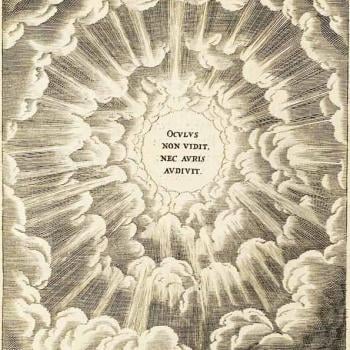
God, by nature, is simple. God has no parts. Likewise, God, by nature, is incomprehensible to us. We can never comprehend the divine nature. Any attempt to do so will come up empty. Due to the simplicity of God, we can’t divide the divine nature up into lesser parts in order to comprehend them. For if we could do so, that would mean God is composite, composed of parts, and not simple. This is why anything which we comprehend about God is not God as God is by nature.
However, we are not left unaware about God. God acts and works in such a way so that we can come to apprehend truths about God. We know God by what God does. Although God in the divine nature is one and simple, and in that simplicity, engages in one simple eternal activity, we apprehend that activity in the way it appears to us, in a plurality of activities. Each of those activities provides us some insight about God, and so through each and every one of them, we find ways in which we can name God who, nonetheless, remains transcendent and above any and all names which we employ. This realization is what lies behind the theology of St. Gregory Palamas and his description of the divine energies – we know God through the divine energies, not by the divine nature; we know God through the way the one eternal activity of God appears to us as a diversity of activities which we can label and name and then use to describe God:
The divine supraessentiality is never named in the plural. But the divine and uncreated grace and energy of God is indivisibly divided, like the sun’s rays that warm, illumine, quicken and bring increase as they cast their radiance upon what they enlighten, and shine on the eyes of whoever beholds them. In the manner, then, of this faint likeness, the divine energy of God is called not one but also multiple by the theologians. [1]
We know God through the one uncreated energy which is capable of being apprehended by us in a variety of forms and manners. God’s divine nature remains one and simple, as God is simple in activity, but that activity is capable of being logically divided and distinguished by us so that we can refer to God in a variety of names. God is good, God is just, God is beautiful, God is love, God is holy, God is king, God is merciful, and the like. All the ways we perceive of God, we do so not through the divine nature, but through God’s activities or energies. As God is unchanging and uncreated, so those energies, those activities also are uncreated. Each time we name God with a different characteristic or quality, we refer to God through a particular energy or activity of God. We do not directly relate to or establish the divine nature, but only the way that nature manifests itself to us. And yet, as God is one “Spirit,” so the nature is one, and the energy, which is one with the nature, is ultimately one, even if we can apprehend the energy in and through a diversity of forms: “Therefore the powers and energies of the divine Spirit – even through they are said in theology to be multiple – are uncreated and are to be indivisibly distinguished from the single and wholly undivided essence of the Spirit.” [2]
We apprehend God, therefore, by God’s uncreated energies; we receive them according to our own particular capacity. Through them, we have a means to join ourselves to God, to be united with God, to be deified. For we are united with God by grace. Since we can comprehend it, grace is not the divine nature, but yet it is not other than God, for grace is itself the uncreated energy of God through which we can be one with God. “And since the divine and deifying illumination and grace is not the essence but the energy of God, for this reason it comes forth from God not only in the singular but the multiplicity as well. It is bestowed proportionately on those who participate in it, and corresponding to the capacity of those who receive it the deifying resplendence enters them to a greater or lesser degree.” [3] God, therefore, acts towards us and reveals truths concerning the Godhead in accordance to our ability; we will receive the divine energies which we are capable of engaging and comprehending. Since they are not God’s simple nature, there is no contradiction between our ability to comprehend various divine energies with the divine nature being incomprehensible to us. If the energies were simply the divine nature, and not logically divided from it, they too would not be comprehensible by us in any fashion. That would leave us incapable of receiving any of God’s grace in our lives. Thus, St. Gregory Palamas tells us, however paradoxical it might seem, we must acknowledge the absolutely simple divine nature of God through the way we apprehend and comprehend it from the uncreated energy (energies) of God. If we do not, either we will turn the divine nature into something which is less than we are, or we will end up without any way to know anything about God. Such agnosticism leads directly to atheism, for when we deny the activities of God in and with creation, then it becomes simple to deny God, for every nature which is real has activities which it engages. Denying such to God would suggest God is not real and so can be dismissed.
[1] St. Gregory Palamas, “Topics of Natural and Theological Science and on the Moral and Ascetic Life: One Hundred and Fifty Texts,” in The Philokalia: Volume IV. Trans. and ed. G.E. H. Palmer, Philip Sherrard, Kallistos Ware, et. al. (London: Faber and Faber, 1995), 377 [#68].
[2] St. Gregory Palamas, “Topics of Natural and Theological Science and on the Moral and Ascetic Life,” 377-8 [#68].
[3] St. Gregory Palamas, “Topics of Natural and Theological Science and on the Moral and Ascetic Life,” 378 [#69 ].
Stay in touch! Like A Little Bit of Nothing on Facebook.
If you liked what you read, please consider sharing it with your friends and family!
















